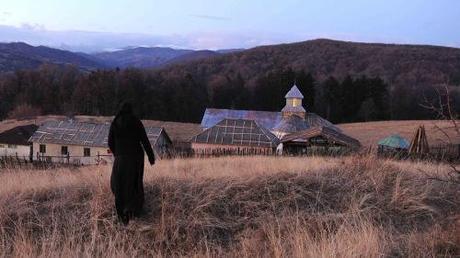
Beyond the Hills has to be commended for talking up to its audience in such a way as to cause completely unwarranted optimism in the young cinephile. Christian Mungiu might be called a contemporary master of the close-up. He’s also so unassuming as to be disarming. So little posturing. So little talk, so much walk.
And like many great directors, he makes it look easy. The opening shot is kind of a stunner. Although, again, the word is unassuming. All Mungiu has to do is commit, and commit he does. The camera follows the back of a head, heading the wrong way up a crowded train platform. By wrong way, I mean that everyone else in the known universe is going the opposite direction of this small figure (which, as the first person on screen, we have already subconsciously assumed to be our hero.) The salmon upstream.
The conflict is so obvious as to seem narratively cheap, or visually worse—a type of shorthand or cliché. But Mungiu sticks with it. He lets the battle continue maybe ten seconds longer than you might expect. He believes in the psychological effectiveness of the tried and the true, and he comes out on top. From the beginning, we’re straining forward. We’re trying to pick out the face of our hero, and once we’ve picked it out, we’re trying to draw from it some sort of truth. Some sort of certainty, or a verification of a wholly knowable psychological/ emotional/ spiritual state. What we get is a bottomless well, and down it you shall surely fall.
Beyond the Hills is an apt title for a film all about peering beyond the physical, about trying to get a peak beyond the geography of our world and our bodies. What’s out there begins as anyone’s guess, but becomes a sort of key question. What’s in there represents an echo of that question, or else its natural and lonely answer. The battle between good and evil on earth is rendered by Mungiu as a love story, and if the viewer clings to that love story even as the story hurtles forward, they won’t be disappointed.
Mungiu, a student of English literature, has since drawn upon the Cinema of Contemplation’s progress—whose films in particular is a question I leave for the comments—and come away with a generous supply of techniques for filming his questions or theses or stories.
Besides the obvious durational influence (the aesthetics of the slow are here) there is also the tendency to show the corner of something, so as to make us look closer. To show a fragment of the whole, not to imply helpfully (about the nature of the whole) as a documentarian might, but to productively torment, to bring us to the question of what is that? This is the ledge beneath which the uncanny is always creeping, ready to remind us how small we are.
This particular tendency has led filmmakers to photograph the backs of lovely young girls’ heads for a long time, and it’s a game that Mungiu is up for. It’s been a long time since I’ve seen 4 Months, 3 Weeks, 2 Days, but I suspect that back-of-the-head game is a bit different in its end, but hardly in its means.
The other great locus of the Mungiu-uncanny (although some jaded viewers may find it so boneheaded as to embarrass me) is the way he mines his environment (while many directors would find it one-note) for expressionism. Expressionism as a tendency is criminally rare and clumsy these days, and the clumsiness and rarity made mentionable by one another. That is, because solid environmental expressionism has all but vanished from the Western cinematographic vocabulary, it’s become a psychological heavy-hitter again.
The back of our hero’s head, at one point, only partially eclipses an out-of-focus window, perhaps occupying a sixteenth of the frame. Beyond this window, snow is falling. The falling snow is the only mentionable movement in the frame. The space between it and the (in-focus) back of our hero’s head, is the only space we wish (subconsciously or quite consciously depending on the viewer) to occupy, because it contains the face, and if we only could see that face, we feel, we would be able to guess the ending of this parable. We would be able to see whether all of this were occurring in heaven, or in hell.
But the world is never that simple, and graciously, generously, torturously, vitally, neither is Mungiu’s cinema.
-Max Berwald
